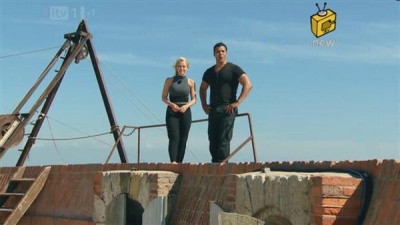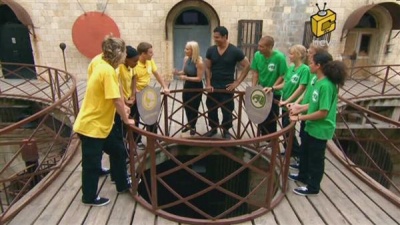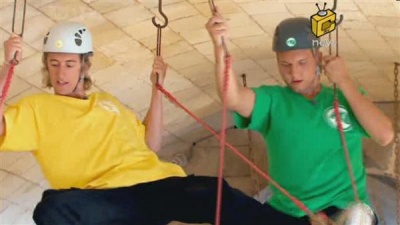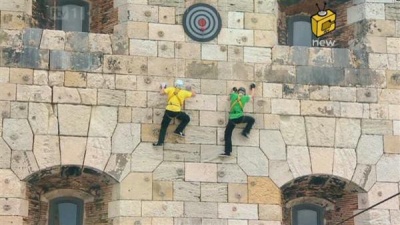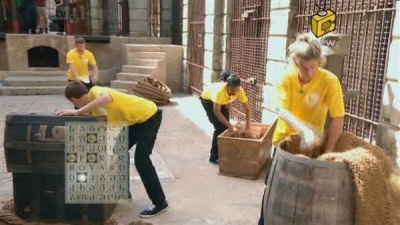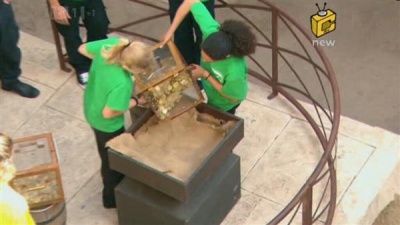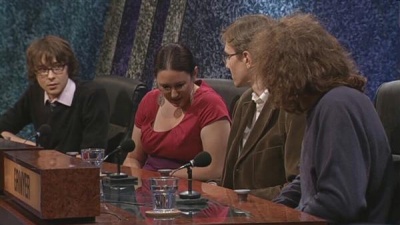Weaver's Week 2012-02-19
Last week | Weaver's Week Index | Next week
Tu jamais pas as les temps!
Contents |
Fort Boyard: Ultimate Challenge
The Foundation / Adventure Line Productions for CITV (simulcast by ITV Breakfast Broadcasting Ltd), from 1 January
If we'd declared the Best New Show of 2012 poll closed at 8.30 on New Years' Day morning, the clear winner would have been this show, ahead of "Ow, my pounding head", and "It's half past eight on new year's morning let me get some sleep". Fifty days into the year, we can perhaps take a more considered and less hungover view.
Now, this column likes Fort Boyard. We really enjoyed the Channel 5 series around the turn of the century, and our main annoyance with the Challenge re-mounting a few years later was that it lacked Leslie Grantham as M. Boyard. Since then, we've spent many a summer's evening watching the French version repeated on TV5, a year behind people in France, and polishing up the bits of the language we need to know.
More importantly, it means we've seen the way Fort Boyard has changed and evolved over the past decade. We're able to bridge the gap between the Challenge episodes and this new run, in a way that people who only watch UK television won't manage. The target audience – children of about twelve, disappointed that Raven has flown the CBBC nest – come in without these expectations, Fort Boyard: Ultimate Challenge is what it is.
What is the show? Well-structured. There are six teams of players, each named after a colour and a wild animal, and in any episode two of these sides take part. In the first half of the show, four challenges are played. Two of these are head-to-head races, such as the traditional climb-up-a-wobbly-ladder-while-your-team-holds-it-still, first to the top wins the key. The other two are individual challenges, it's one team against the clock, with the key the reward for completing the challenge in time. We've not seen anyone overstay their time in the challenge room, and we assume that there won't be any lock-ins.
Having experience of Fort Boyard through the years, we recognise most of these as challenges of strength and skill played for keys by the adult competitors, not the tests of stamina and fortitude played for clue words. But this isn't terribly relevant to the Ultimate Challenge show, where the only metric is keys.
There's a fifth challenge, one we've seen played by the Maîtres de Tenebre, the masters of darkness, whose role is to grant extra time to teams in the main show. For Ultimate Challenge, it's a simple head-to-head. Who can spell out "Boyard" by threading beads onto a needle, picking up the beads with chopsticks? The winning team gets the last key.
The optimum result is three keys, allowing the full three minutes in the treasure chamber. Two keys means the team loses 20 seconds, each key fewer results in one additional person spending a further 20 seconds outside the room. Should a team win four keys, they get a bonus of 150 points on their score.
What happens in the treasure room is a wonderfully language-independent game. The room is – effectively – halved down the middle, with a 3x8 grid for each side. Four copies of the team crest are hidden in boxes to the side of the room, and each team is given a map. Once they've put their copies of the crest on the right squares, they can open the treasure chest and start collecting gold. This game doesn't require any specific language, it works in English, French, Serbian, Etruscan. Once everyone's out, the gold is weighed, and added to scores on the leaderboard, and we're promised that the top two will come back for the final.
Hosts are Geno Segers, who has a deep bass voice and southern American accent; and Laura Hamilton, much more high-pitched and British. The presence of the Americans is because the series was part-funded by the Disney corporation, and one of their channels will pick up rights to the series later in the year. The pair do a professional job, and it's to their credit that we don't come away remembering their work as much as the players'. Perhaps the only slight disappointment is that Paul Farrer's written a music score from scratch, without the slightest reference to Paul Koulak's theme and variations.
The challenges in the Fort are carefully designed to be just within the reach of the competitors, they will be able to achieve victory, they may need to stretch themselves a little. And the challenges are something that the viewers can relate to – it may be pointless to carry buckets of grain through a loom, but there's no difficulty in working out what the player is doing. Look carefully, and note that the player described in the introduction as "scared of heights" tends to play a high game, making their achievement that little greater. We mentioned Raven in passing earlier, and Fort Boyard: Ultimate Challenge looks to be a credible replacement, players doing something that's obviously an achievement.
Even better, FB:UC isn't bound by the accumulated history from its parent series, and doesn't suffer for letting it drop. There's no Laboule to take people prisoner, not even a big gong. Passe-temps and Passe-partout aren't required to lead the teams through the fort, we don't even see anyone running about after the introductions. There are no mental challenges, so Pere Fouras is undisturbed in the watchtower, and Felindra is clipping her tigers' claws, explaining why they're not in the treasure room. There are just enough familiar games to satisfy people who did watch the Channel 5 and Challenge series – Sky Bike, crawling along the cylinder, going down a zipline and swimming to a raft – but many more new challenges.
Fort Boyard: Ultimate Challenge works as an introduction to the Boyard canon, and it's faithful to the spirit of earlier shows. A tremendously difficult task, and we salute the producers for making it look so easy.
University Challenge
Cup of Colleges, Match 744: Balliol Oxford v Homerton Cambridge
Balliol's most recent match was a loss to Pembroke Oxford on 2 January; Homerton fell to Clare a fortnight later. Though the draw is arranged to prevent two quarter-finalists from meeting again before the final, it doesn't stop a re-match between two sides that met in the Qualifying Round. Balliol beat Homerton by 205-200 on 1 August.
Balliol have the top-row seats this time, and they give the first correct answer of the night. Thanks to a blank on the Hundred Years' War, Homerton gives the second, and they do only slightly better with questions on porridge. The Diversity Watch file notes that Balliol has sent an all-male team this year, and they fail to get to grips with a question about the Seven Sister schools, the women's equivalent to the Ivy League. The visual round is on lines from Little Billy Shakespeare, "translated" into the International Phonetic Alphabet, that well-known joke amongst linguists. The scores end up level at 35-35.
Spheres prove somewhat more fruitful territory for Balliol, and three questions about a shade prove that blue actually is Balliol's colour. Neither of the teams remembers how to read Etruscan, which probably isn't a surprise. Nor do they know how many pounds there were in an imperial stone. But they do know about the quondam internet phenomenon Chat Roulette, where you never knew which moggie you were going to see next.
In the audio round, no-one knows the composer's Mendelssohn, so Balliol has an 85-30 lead. Though Balliol eventually get the audio bonuses, Homerton reply swiftly, and we get the feeling that if they can build up a head of steam, Homerton will be on winning form. We are going to quibble about the question about the first space probe to leave the solar system, because that depends on how the solar system is defined – the orbit of Neptune was crossed by Pioneer 10 in 1983, leaving the sun's exosphere was Voyager circa 1999.
All of this has taken place while Balliol drew up a small head of steam, and they lead 135-50 at the second visual round, on royal mistresses. Or, as Thumper puts it, "Lily Langtree, Edward the Seventh's squeeze". Five minutes and 60 points to go, so very much catchable. Balliol get the next starter, and get two questions on Samarkand. Homerton fire back with just one on probability distributions, much to their own displeasure. A starter goes begging, then Balliol score with the matrix and US attorneys-general. That leaves it 85 points with two-and-a-bit minutes.
Homerton get the next starter, but they need to get the lot on French homonyms, and quickly, and they do. And the afterburners are on, a river in a desert and words beginning KIE score. Balliol manages to pick up a missignal, but Homerton drop the starter. They get the next one, but there's time for no bonuses. That's the game, Balliol win 170-145, which means they play the LSE in two weeks' time. On this form, we doubt they'll win – just 13/33 bonuses and 24/60 overall tonight. Homerton made 14/21 bonuses, and the teams combined for correct answers to 46 of 81 questions.
Next match: Manchester v Clare Cambridge
Mastermind
Heat 15
This episode was shown in Northern Ireland at 5.30 on Saturday evening, and will be shown in Wales at 7pm on Monday. Consider this a formal Spoiler warning.
James Cullen kicks us off this week, with the Life and Music of Kate Bush (b 1958). Rocketing to fame in 1978 with the unearthly single "Wuthering Heights", Bush is an exotic and individual performer who has retained a legion of super-loyal fans. Her pace of work slowed somewhat, with a twelve-year lacuna between releases. And Fort Boyard fans thought they had it bad... By any standard, this is good: 15 (1). Bark on: "Hounds of Love"*.
Edwin Deady is now going to tell us about Ancient and Primitive Boats. Ways of crossing water using planks of wood belted together, possibly with some buoyancy aids. This was a difficult subject, perhaps one of the more bizarre ones, the contender scored four more points than we did, and managed to do so with no passes. Float on: Build your own Kon-Tiki raft.
Jackie Heaton has been reading the Detective Novels of Agatha Christie (1890-1976). Bing bong! Large subject alert! The reading list begins with "The Mysterious Affair at Styles", in which Hercule Poirot investigates strange goings-on at a country estate, and continues in a similar vein for over a hundred books until "Sleeping Murder", in which Miss Marple solves a case. Though the contender never quite seems to settle, she scores 11 (3). Solve on: "And Then There Were None"*, our pick of her work.
Anthony Barton studied the Franco-Prussian War (1870-1). Ostensibly a war between France and Prussia, the Hitch-Hiker's Guide to the Galaxy suggests this was actually a Cunning Plan for Otto von Bismarck to demonstrate the strength of the Prussian Army, and hence bring about unification with Germany on his terms. There are guest appearances for Garibaldi and The Communards, because no game show is complete without Rev. Coles. 15 (1). War on: Stephen Badsey's introductory history*.
Mr. Deady is going to take some cocktails, and will answer a question about poison. We never knew that "aspirin" was a prize in the Great War, and the contender doesn't know about Jeffrey Archer. In a very real sense, he wins! 12 (6). Jackie Heaton has the piano, a shuttlecock, "Little Voice", but doesn't get a question about tuberculosis. The round falls away after a strong start, ending on 20 (9).
James Cullen is first up amongst the joint leaders, and we're not sure if going first is the advantage. Cast of the "Harry Potter" films starts the scoring, and even though "jaguar" is a guess, it's a correct guess. Perhaps he's worked out that he'd be better guessing than passing; certainly he's able to remember Simon Mayo's other regular engagement, hosting a film review show with Dr. "Mark" Kermode. The round does tend to fall to pieces after that, and ends on 22 (5).
So Anthony Barton needs just eight to win. Rome gets him off to a good start, with Captain Oates following on his heels. But then comes a pass, an error, but three correct answers restore the contender's confidence. He reaches the winning post with a minute to spare, finishing on 26 (6).
Heat 16
This episode will be shown in Wales at 7.30 on Monday, and in Northern Ireland at 7pm next Thursday. Spoiler-iffic!
Alison Rawlinson is going to take the Children's Fiction of Rudyard Kipling (1865-1936). Best known for "The Jungle Book" and "Gunga Din", Kipling wrote a surprisingly large canon of work, all now in the public domain. The contender relishes the excuse to say "stickly prickly hedgehog", finishing on 9 (3). Mowgli on: "The Jungle Book" from Project Gutenberg.
Euan McCulloch will set sail on http://thegreatoceanliners.com/ World Passenger Liners 1939-79]. Ships such as the Queen Mary, the Queen Elizabeth, the America and the Canberra were small towns that happened to be on sea. Over 1000 feet long, ten floors high, with a crew that could rustle up prunes and custard if people wanted it. That's about the only thing going wrong here, the score is 14 (0). Float on: "Ocean Liner Posters"
Martin Smith is going to tell us about Motorhead (est 1975). Or, to give them their rock-umlaut-tastic name, Motörhead. Formed when Lemmy was kicked out of Hawkwind for being a bit drug-addled, his group originally had the Missing Vowels name of BSTRD, but were told to change it or they'd never appear on Top of the Pops. They're best known for their 1980 work "Ace of Spades". The group have continued to record in the years since, and we last came across Motorhead on Kerrang! Radio a year or so ago, when they "won" a shabby phone vote after their opposition was "disqualified" for the crime of having fans who were passionate, motivated, and alive. Nothing dead about this round, which finishes on 14 (1). Rock on: The Creamy Muck-Muck Tune*.
George Ferzoco takes us on a spin through the Life and Work of Federico Fellini (1920-93). One of the most influential film directors ever, Fellini made "La Dolce Vita", an inquiry into Italian culture of the 1950s; "8 and a half", a director's confusion about his career; and ""Roma"*, about the eternal city. Yes, they're right to give him a mark for muffling one syllable in an eight-syllable disease name. Eight syllables! That's far too long an answer! 13 (0).
Alison Rawlinson is confused by the description of Arlene Phillips's career, it includes "dancing" but manages to miss out the words "Come" and "Strictly". She does manage to score well, finishing on 20 (5). A good week when that's a fourth-place score; it would have been second place in the last show.
George Ferzoco scores with Venus and the yak and Daniel Defoe, and the sporting event scheduled for Qatar. The Hitler Diaries give him the lead, he finds the Brontës and Sun Records and Poland to extend it, and the contender suggests that "hedge fund" and "fraud" are synonymous. 27 (1) is his final score, and that'll be enough for the repechage board — if he finishes second!
Euan McCulloch decodes the name of "El Salvador", but finds scoring slow. He doesn't know about the recording career of Eric Clapton, and why should he; he does know that France's Kilometre Zero is in front of Notre Dame. The final score is 22 (4).
The repechage board:
- John Marshall 31 (5)
- John Snedden 30 (4)
- Paul Smith 28 (3)
- Eliot Wilson 28 (5)
- Chris Wills 27 (1)
- Martin Smith 27 (5)
So, Martin Smith needs another fourteen points to be assured of coming back. "The Boat that Rocked", the theory of utilitarianism, and the recording career of Shakin' Stevens all score points. He picks up points, slowly, softly, creeping up on them as though they were birds to take flight at the loudest noise. But he also picks up passes, and can win if he gets the final question right. He doesn't, 27 (5) is the final score.
Which means that George Ferzoco has won, he'll be back. Martin Smith's score ousts Chris Forse from the repechage board, and he enters in last place. With eight heats to play, it's clear that 29 points will go through, and we're more confident that one or both players on 28 points will come back.
This Week And Next
Only Connect fans will know that no-one has ever scored from a question about the "Twilight" books and movies. After "New Moon" and "Eclipse" comes naught but blank faces; Team Jacob and Team Edward have as many recruits as Team Alice. But we were watching Accumulate! and, what should pop up, but a question on "Twilight". Of course the team got it right, demonstrating that Accumulate! threesomes could beat Only Connect trios. Under certain circumstances, of course; there's no evidence to attest the Stainer's skill at building towers from cups and paper plates.
Ratings in the week to 5 February, where Dancing on Ice had 7.2m people wondering if it was going to be a Just Outside Broadcast. 5.15m saw The Magicians on Saturday, a series best; the same score for Masterchef on Wednesday. University Challenge recorded 3.05m, QI its year's best of 2.85m. Million Pound Drop its year's best of 2.3m, and Channel 5 had World's Toughest Trucker, 1.25m people saw the lorries. Got to Dance had its last week on top of the digital pops, 1.065m people saw the performances. Take Me Out The Gossip pulled 850,000, and with 635,000 viewers, Only Connect Wall Night finished roughly level with Pop Idle Us, and ahead of Come Dine on More 4.
Coming up this week, a contractually-obligated run of The Celebrity Apprentice Us (BBC1, from Sunday). Level of celebrity not guaranteed. Two new series for Radio 4 – Wordaholics (11.30 Monday) and It's Not What You Know (6.30 Thursday). Those of you with day jobs and wondering what on earth this Pointless thing is all about will meet Pointless Celebrities (BBC1, 6.15 Saturday) including Christopher Biggins and Lesley Joseph. It's followed by Eddie "The Eagle" Edwards on Let's Dance for Sport Relief (7.10).
Links marked with a * help support the UKGameshows servers.
To have Weaver's Week emailed to you on publication day, receive our exclusive TV roundup of the game shows in the week ahead, and chat to other ukgameshows.com readers, sign up to our Yahoo! Group.


